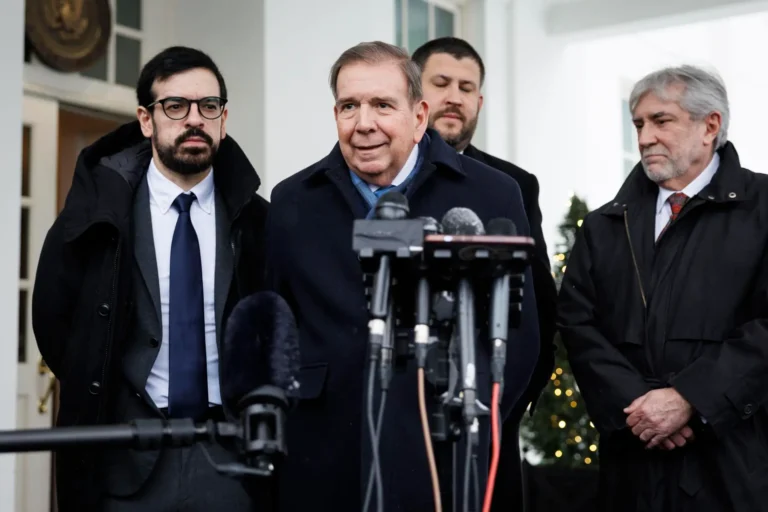
The fugitive Venezuelan opposition figure Edmundo González, escorted by the same fascist group from the 2019 interim government. Photo: EFE
Caracas, January 10 (RHC)-- The far-right maneuver on January 6 marks a revealing moment in Washington's current involvement in the destabilization against Venezuela. The appearance of Edmundo González Urrutia, flanked by David Smolansky and Miguel Pizarro, is a sign that violent plans remain the option of an international fascist network.
The visit of González Urrutia to the White House presents itself as a deplorable spectacle, although they say otherwise. The meetings with the outgoing presidents Biden and Lacalle Pou, along with the Argentine Milei, were, except for the one in Buenos Aires, meetings with the outgoing administrations. President Biden, discredited and with popularity at rock bottom, only said that he "supports him wholeheartedly."
However, a relevant aspect to highlight is the orientation of these governments regarding their support for Israel. All those who support the "Guaidó 2.0 Plan," including Uruguay along with Panama, Guatemala, Paraguay, and a tiny group, backed the U.S. and Israel's genocide against the Palestinian people.
In this regard, it is relevant to remember Smolansky's firm public support for Israel's expansionist Zionist policies in the Middle East. The first vice president of the United Socialist Party of Venezuela (PSUV), Diosdado Cabello, recalled a few months ago that he represented Zionism in the country. "I used to say, when this man was mayor of Hatillo, that he was the project of Zionism in Venezuela," he emphasized.
The presence of Smolansky and Pizarro in Washington also demonstrates that the network of think tanks like the Wilson Center and the Atlantic Council, and other institutions and NGOs, are behind the strategy of the Venezuelan far-right. For example, Pizarro's role in the Venezuela Working Group at the Adrienne Arsht Center for Latin America, affiliated with the Atlantic Council, provides direct links to political networks aligned with NATO.
All this stagecraft that keeps Edmundo Gonzáles moving is guaranteed by the "Guaidó interim government" scheme where both Smolansky and Pizarro were accomplices. Both individuals face serious accusations from Venezuelan authorities for their active involvement in the confiscation of Citgo in the U.S.; the multi-million dollar corruption scandal related to Monómeros in Colombia; and the seizure of 31 tons of Venezuelan gold by the Bank of England, to mention a few.
These actions contributed to Venezuela losing more than 230 billion dollars in revenue, demonstrating how financial mechanisms serve as instruments of political pressure. At the time, the Attorney General denounced that the accused received funding and conspired with Exxon Mobil against Venezuela in an attempt to fracture the sovereign struggle for Esequibo.
Another example was the participation in the failed foreign intervention with the concert "Venezuela Aid Live" on February 22, 2019, in Cúcuta, a Colombian city on the border with Venezuela. Although it represented a sophisticated attempt to challenge Venezuelan sovereignty, we observed how the Colombian narco-paramilitary mafia was used as a spearhead, including Los Rastrojos. Lilian Tintori's subsequent admission in New York about collaborating with "paramilitaries" and "irregular groups" provides an enlightening context to understand how humanitarian pretexts serve destabilizing objectives.
Moreover, the involvement in parallel administrative structures, exemplified by the designation on February 13, 2019, of an ad-hoc board for PDVSA, was part of the "Guaidó 2.0 Plan" that sought to establish institutional frameworks for the theft and plundering of the nation's resources.
The strategy of institutional "duplication" deepened the economic impacts at that time; now, Edmundo González and María Corina Machado are once again attempting to cause the same negative consequences for the Venezuelan population.
Family ties of González Urrutia with drug trafficking
The recent investigations related to Rafael Tudares Bracho, son-in-law of González Urrutia through marriage to Mariana González, whose alleged connections with international drug trafficking networks, especially with operations between Latin America and the United States, add another element to the file of the fugitive opposition member.
The framework of the investigation focuses on Tudares Bracho's executive position at AguaExport Latam LLC, a Miami-based transportation company that was the subject of an investigation in 2022, when U.S. authorities intercepted a vessel related to this company.
The operational activities of this company intersect with investigations into regional drug trafficking networks, particularly those related to the Colombian drug trafficker Abraham Enrique Fernández, known by the alias "Alta Amigo," who was arrested in Santo Domingo by Dominican authorities in March 2023.
Seen this way, the recent events surrounding González Urrutia follow the same patterns of international intervention and the convergence of interests between American lobbying groups and transatlantic ones like the Madrid Forum and the IDEA group, articulated with the criminal networks of the regional right that operate on multiple economic, political, and military levels.
On the eve of a new constitutional period for President Nicolás Maduro, the tensions created by hegemonic media narratives are the persistent bet on the failed intervention of recent years.

